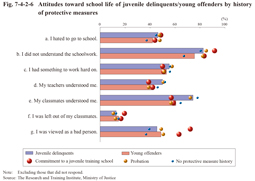6 Attitudes toward school life
Fig. 7-4-2-6 shows the attitudes of juvenile delinquents/young offenders toward their life at the school they most recently attended.
Over 80% (82.7%) of juvenile delinquents gave affirmative answers to “I did not understand schoolwork” and nearly half (46.4%) did so to “I hated to go to school” whereas only around half (55.4%) did so to “I had something to work hard on such as extracurricular activities, etc.,” thus indicating a general maladaptation to school life. With regard to interpersonal relationships at school as many as 74.4% gave affirmative answers to “my classmates understood me,” but also nearly half (45.5%) did so to “I was viewed as a bad person” by the people around them, thus indicating that many of them did not feel content with their interpersonal relationships. By history of protective measures, these trends were more strongly observed with those with a history of commitment to a juvenile training school than with all juvenile delinquents, thus indicating that those with the said history were less adaptive to school, and had a stronger sense of being alienated. Those without a history of protective measures, however, were observed to be relatively good at schoolwork and to have better interpersonal relationships at school.
In contrast to this, with young offenders the percentages of those that gave affirmative answers to “I hated to go to school” (41.9%) and “I did not understand schoolwork” (75.5%) concerning maladaptation to school were slightly lower, but those to “my teachers understood me” (42.9%) and “my classmates understood me” (60.6%) concerning interpersonal relationships were also lower (those to “I was left out of my classmates” (14.8%) and “I was viewed as a bad person” (48.6%) were slightly higher) than with juvenile delinquents, thus indicating that the percentage of those that had a sense of being alienated tended to be higher with young offenders than with juvenile delinquents. By history of protective measures, with young offenders with a history of commitment to a juvenile training school tended to be less adapted to school and to have a stronger sense of being alienated, as with juvenile delinquents. However, with young offenders with a history of commitment to a children’s self-reliance support facility, etc. only around 1/3 (33.3%; 54.5% with those without the said history) gave affirmative answers to “I had something to work hard on such as extracurricular activities, etc.,” thus indicating a lack of positive experience in their school life.
Fig. 7-4-2-6 Attitudes toward school life of juvenile delinquents/young offenders by history of protective measures
